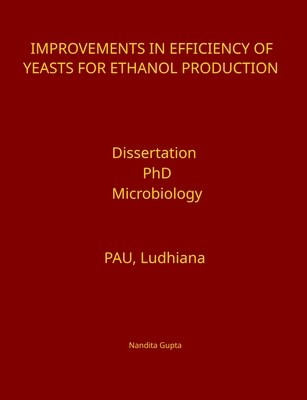
- We will send in 10–14 business days.
- Author: Nandita Gupta
- Publisher: Devotees of Sri Sri Ravi Shankar Ashram
- ISBN-10: 9395766484
- ISBN-13: 9789395766487
- Format: 18.9 x 24.6 x 0.6 cm, softcover
- Language: English
- SAVE -10% with code: EXTRA
Improvements in Efficiency of Yeasts for Ethanol Production (e-book) (used book) | bookbook.eu
Reviews
Description
DISSERTATION
Submitted to the Punjab Agricultural University in partial fulfillment of the requirements for the degree of
DOCTOR OF PHILOSOPHY IN MICROBIOLOGY.
Eight strains of yeasts, namely S. cerevisiae-220, S. cerevisiae-360, S. cerevisiae-181/3c, Trichosporon beigelli, Candida haemulonii, C. parapsilosis, Candida sp.-3(1) and Candida sp.-5(2) have been evaluated for their potential to ferment cane sugars to ethanol at three temperatures. S. cerevisiae-220 utilized 84.0% substrate in 60 h at 30 ñ 1 ðC. S. cerevisiae-360 fermented substrate more efficiently (69.3%) at 38 ñ 1 ðC. S. cerevisiae-220 multiply faster at 30 ñ 1 as well as at 38 ñ 1 ðC. S. cerevisiae-220 could withstand 13.0% ethanol whereas S. cerevisiae-360 tolerated only 8.0% of ethanol supplemented in the growth medium. The protoplasts of S. cerevisiae-220 and S. cerevisiae-360 fused together could not generate ethanol more efficiently than their parents at 38 ñ 1 ðC. S. cerevisiae-220 adapted at 38 ñ 1 ðC utilized 64.4% of substrate during 60 h. Wine with commercially outstanding quality has been prepared from Zingiber officianale with S. cerevisiae-220-A at 38 ñ 1 ðC.
- Author: Nandita Gupta
- Publisher: Devotees of Sri Sri Ravi Shankar Ashram
- ISBN-10: 9395766484
- ISBN-13: 9789395766487
- Format: 18.9 x 24.6 x 0.6 cm, softcover
- Language: English English
DISSERTATION
Submitted to the Punjab Agricultural University in partial fulfillment of the requirements for the degree of
DOCTOR OF PHILOSOPHY IN MICROBIOLOGY.
Eight strains of yeasts, namely S. cerevisiae-220, S. cerevisiae-360, S. cerevisiae-181/3c, Trichosporon beigelli, Candida haemulonii, C. parapsilosis, Candida sp.-3(1) and Candida sp.-5(2) have been evaluated for their potential to ferment cane sugars to ethanol at three temperatures. S. cerevisiae-220 utilized 84.0% substrate in 60 h at 30 ñ 1 ðC. S. cerevisiae-360 fermented substrate more efficiently (69.3%) at 38 ñ 1 ðC. S. cerevisiae-220 multiply faster at 30 ñ 1 as well as at 38 ñ 1 ðC. S. cerevisiae-220 could withstand 13.0% ethanol whereas S. cerevisiae-360 tolerated only 8.0% of ethanol supplemented in the growth medium. The protoplasts of S. cerevisiae-220 and S. cerevisiae-360 fused together could not generate ethanol more efficiently than their parents at 38 ñ 1 ðC. S. cerevisiae-220 adapted at 38 ñ 1 ðC utilized 64.4% of substrate during 60 h. Wine with commercially outstanding quality has been prepared from Zingiber officianale with S. cerevisiae-220-A at 38 ñ 1 ðC.


Reviews